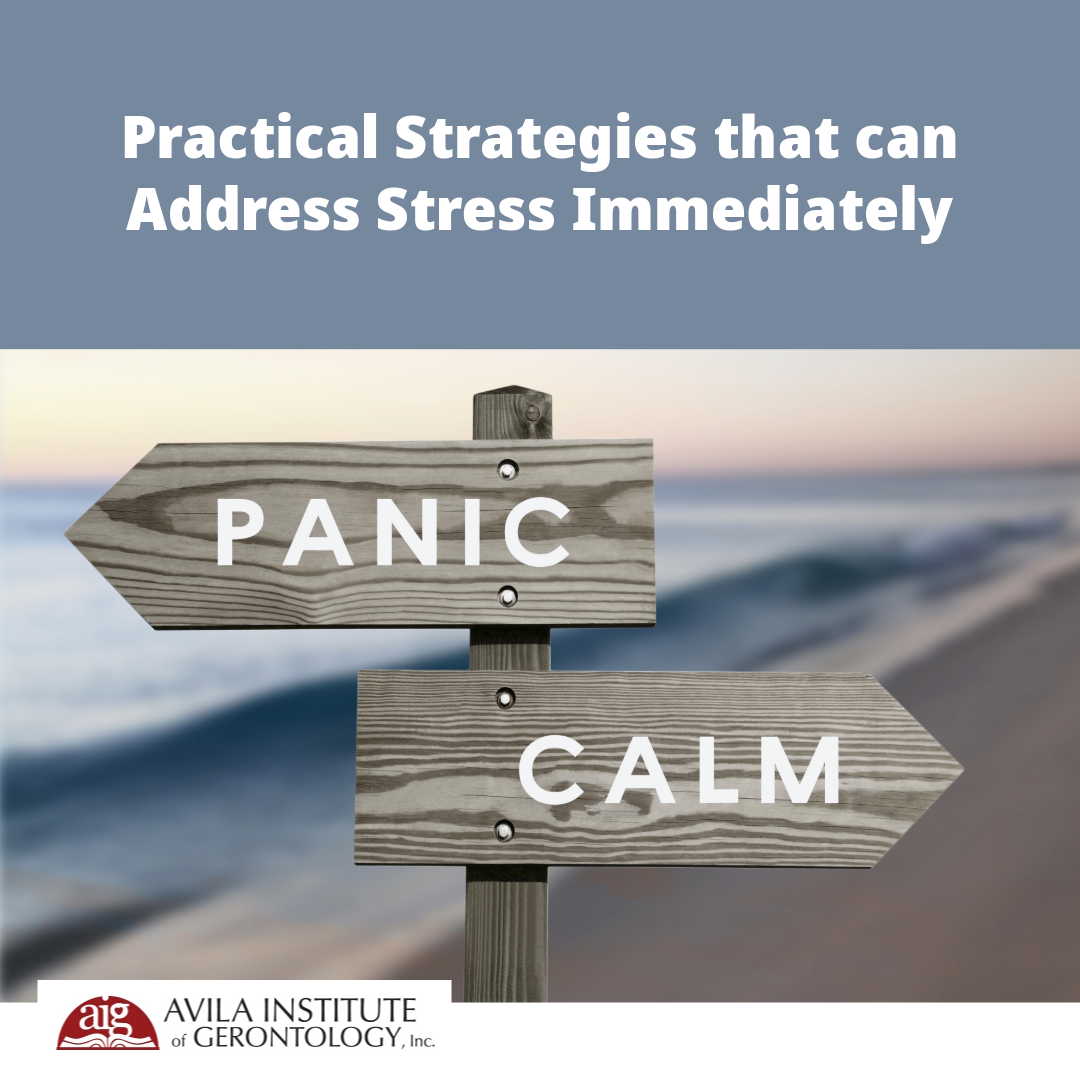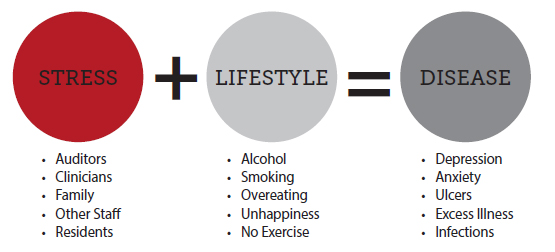
Understanding stress and how to manage it healthily is important for us all to know, especially healthcare workers in long-term care. Earlier this month, we discussed the stressful challenges and triggers that long-term care professionals face on a daily basis. We learned that when left unchecked, stress can accumulate over time, becoming chronic which negatively impacts our mental and physical well-being. Fortunately, there are easy and effective ways to manage stress and restore a sense of balance and calm.
In this blog post, we will explore some practical strategies that can address stress immediately and coping mechanisms to avoid.
Focused Breathing Technique for Short-Term Stress Management
One of the simplest and most effective ways to reset yourself is through focused breathing. Research has found that becoming aware of your breathing and adjusting it to a slow, deep breathing pattern can work wonders. By slowing your breathing rate and counting your breaths, you can change your body chemistry, allowing you to break the chronic stress cycle.
How to Practice Focused Breathing (A Simple Start)
- First, identify a place where you can avoid immediate demands or emergencies. You probably will have to make sure other staff know where you are and that you are taking a five-minute break.
- Second, stand, sit, or lie down in as relaxed a manner as possible.
- Third, rest your hand on your abdomen; this will help you recognize and better control your breathing.
- Then exhale your breath so your lungs are completely empty.
- Breathe in easily and steadily through your nose, envisioning your lungs as balloons filling slowly from the bottom to the top, and counting to yourself as you do this.
- Try counting as you would count seconds; for example, one thousand one, one thousand two, as you fill your lungs. You probably will make it to five or six before your lungs are full.
- When your lungs are full, do the same thing as you exhale. Try to take longer to exhale than you took to breathe in. Both inhaling and exhaling should be about the pace and force you would need to slowly blow out a candle.
- Finally, you may need to repeat this rate of breathing for several minutes or until you feel your stress level come down.
Other Healthy Coping Mechanisms
While focused breathing is a powerful tool, there are other strategies you can incorporate into your daily routine to manage stress effectively:
- Physical Activity: Engage in regular exercise, such as walking, jogging, or yoga. Physical activity releases endorphins, which are natural mood lifters.
- Mindfulness Meditation: Practice mindfulness to stay present in the moment and reduce anxiety about the future or past.
- Progressive Muscle Relaxation: Tense and relax each muscle group in your body, starting from your toes and working your way up.
- Listen to Music: Soothing music can help distract you from stressors and promote relaxation.
- Aromatherapy: Calming scents such as lavender or chamomile can have a soothing effect.
- Talk to Someone: Reach out to a trusted friend or counselor to share your feelings and gain support.
- Practice Gratitude: Shift your focus to the positive by reflecting on things you're grateful for.
Unhealthy Coping Mechanisms to Avoid
Remember, some coping mechanisms can be harmful to your health and well-being. It's important to recognize these unhealthy coping mechanisms and seek healthier alternatives for managing stress. If you find yourself relying on any of these methods, consider seeking support from a counselor or therapist to help you develop healthier coping strategies.

- Substance Abuse: Using alcohol, drugs, or other substances to numb stress can lead to addiction, health problems, and further stress.
- Overeating or Undereating: Some people turn to comfort foods in excess when stressed, while others lose their appetite entirely. Both can lead to nutritional imbalances and health issues.
- Isolation: Withdrawing from social interactions can worsen feelings of loneliness and depression, exacerbating stress.
- Compulsive Spending: Shopping as a way to cope can lead to financial stress and guilt, creating a negative cycle.
- Risky Behaviors: Engaging in dangerous activities as a form of escapism can lead to physical harm or other negative consequences.
- Procrastination: Putting off tasks due to stress can lead to increased pressure and anxiety as deadlines approach.
- Workaholism: Excessive work may temporarily distract from stress but can lead to burnout and neglect of personal relationships and self-care.
- Venting Anger Inappropriately: Lashing out at others or taking frustration out on those around you can damage relationships and lead to regret.
- Avoidance: Ignoring or denying stressors can make them grow larger over time, making the situation worse.
- Obsessive Behaviors: Repetitive or compulsive behaviors, such as excessive cleaning or checking, can worsen stress and interfere with daily life.
- Sleeping Too Much or Too Little: Both excessive sleep and sleep deprivation can negatively impact physical and mental health.
Conclusion
In conclusion, while managing stress is essential, it is crucial to recognize the difference between healthy and unhealthy coping mechanisms. Unhealthy coping can lead to further problems, including physical and mental health issues, strained relationships, and exacerbated stress. By avoiding these negative approaches and seeking healthier alternatives, you can improve your overall well-being and lead a more balanced life.
Follow Us for Tips and Information
Be sure to follow us on Facebook and Instagram for the latest tips and information on dementia for families, long-term care healthcare professionals, and religious communities.
Do you need help taking care of your number one resource, your employees?
The Avila Institute of Gerontology offers invaluable assistance to long-term care facilities by providing comprehensive staff training programs designed to address the multifaceted challenges faced by healthcare professionals in this demanding field.
Avila Institute recognizes that by identifying and addressing these root causes, a healthier and more supportive work environment can be cultivated for both staff and residents. Through targeted training initiatives, Avila equips healthcare professionals with the skills and resources necessary to navigate the complexities of their roles with resilience and efficacy.
By focusing on promoting work-life balance, improving communication, and fostering a supportive workplace culture, Avila empowers staff to mitigate stress, enhance job satisfaction, and ultimately deliver higher quality care to residents. Investing in such training initiatives is essential for creating a sustainable and compassionate long-term care environment where the well-being of both staff and residents is prioritized.
Interested in working with us, use our contact form to reach out.
